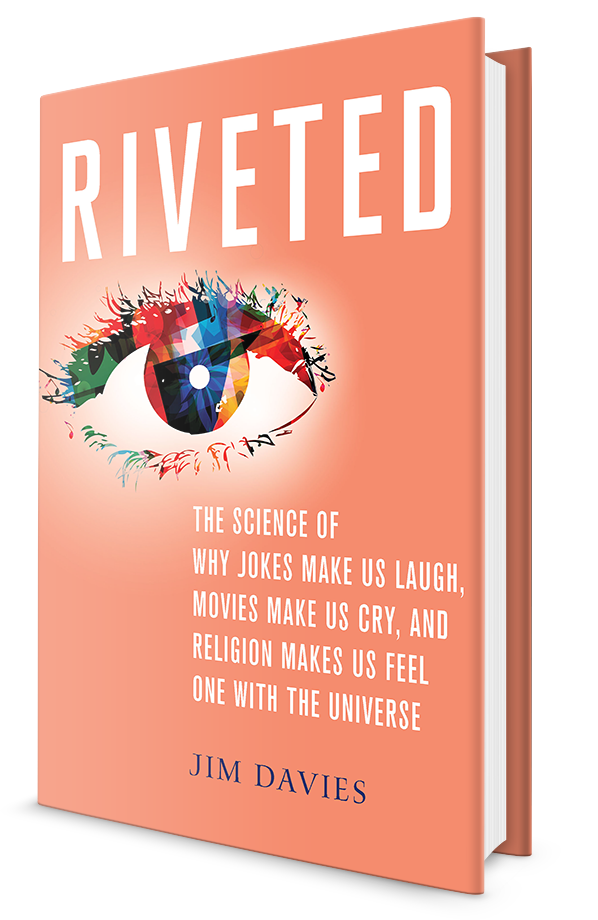
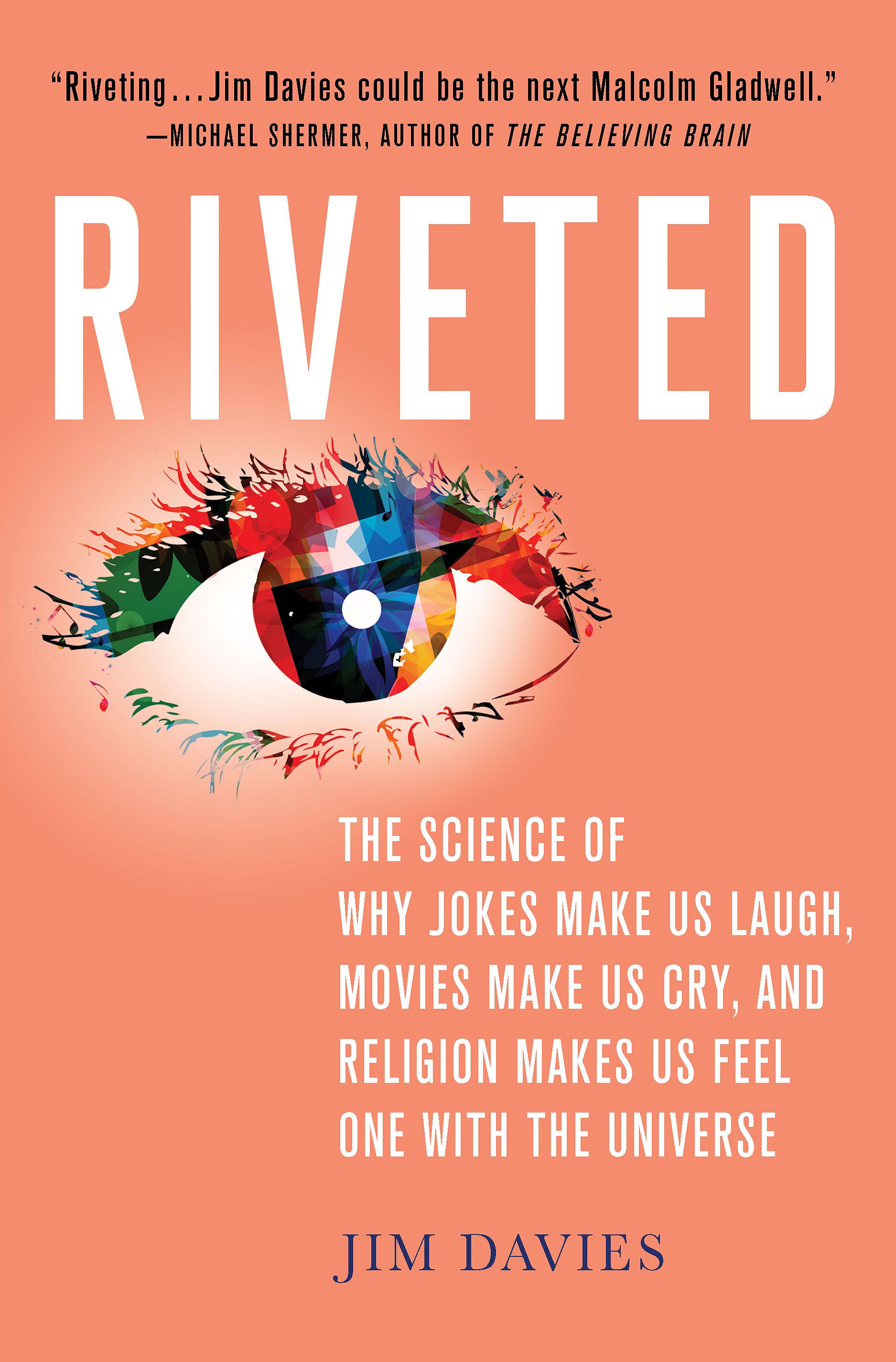
All material on this page may be used free in any publication or medium.
Contact: jim@jimdavies.org; work phone 613-520-2600 x1109
Literary Agent: Don Fehr of Trident Media Group Literary Agency
Publicity: Lauren Janiec at St Martin's Press for Riveted, Jessica Case for Imagination and Being the Person Your Dog Thinks You Are.
Biography (172 words):
Jim Davies is a full professor in the Institute of Cognitive Science at Carleton University, where he has won awards for his teaching and research. He has degrees in philosophy, computer science, and cognitive psychology. As director of the Science of Imagination Laboratory, he explores processes of imagination in humans and machines, and specializes in artificial intelligence, analogy, problem-solving, and the psychology of art, religion, and creativity. His work has shown how people use visual thinking to solve problems, and how they visualize imagined situations and worlds.
He is author of over 50 peer-reviewed publications in the fields of cognitive science, artificial intelligence, philosophy, and psychology. He wrote the popular science books Riveted: The Science of Why Jokes Make us Laugh, Movies Make us Cry, and Religion Makes us Feel One with the Universe, Imagination: The Science of Your Mind's Greatest Power, and Being the Person Your Dog Thinks You Are: The Science of a Better You. He has been asked to speak at four TEDx events, and is co-host of the award-winning Minding the Brain podcast.
In his spare time, he is a published poet, an internationally-produced playwright, game designer, and a professional painter and calligrapher.
http://www.jimdavies.org/
Title: Being the Person Your Dog Thinks You Are:
The Science of a Better You
Author: Jim Davies
Hardcover: 430 pages
Publisher: Pegasus Books (February 2, 2021),
distributed by W. W. Norton & Company
Languages: English
ISBN-10: 164313650X
ISBN-13: 978-1643136509
APA Citation: Davies, J. (2021). Being the person
your dog thinks you are: The science of a better you. Pegasus Books.
Publicist: Jessica Case at Pegasus books, jessica@pegasusbooks.us
This book's webpage is at http://www.jimdavies.org/science-of-better/
A crisp and sparkling blend of cognitive science and human behavior that offers meaningful and attainable pathways towards becoming our best selves.
Why do we feel like in order to be productive, happy, or good, we must sacrifice everything else? Is it possible to feel all three at once? Without even knowing it, we’re doing things everyday to sabotage ourselves and our societies, habits that prevent us from optimizing long term happiness. Where most books imagine solutions that, when enacted, fail to fundamentally improve our lives, Jim Davies grounds his research in cognitive science to show you not only what works, but how much it works.
Being the Person Your Dog Thinks You Are shows us how we can use science to become our best selves, using resources we already have within our own brains.
Davies' book challenges and inspires us to approach the big picture while also staying mindful of the everyday details in real life. Davies proves why multitasking is bad for you, when a little unmindfulness can be good for you, how to best justify which charities to donate to, and how to hack your brain.
The most surprising truth Davies offers us spreads across these pages like wildfire: you too can lead an optimally good life, not through uprooting your life from the ground up, but from adapting your mentality to your given present. A better life doesn’t need to look like a massive change—like our beloved dogs who already view us as our best selves, it’s already much closer than you think.
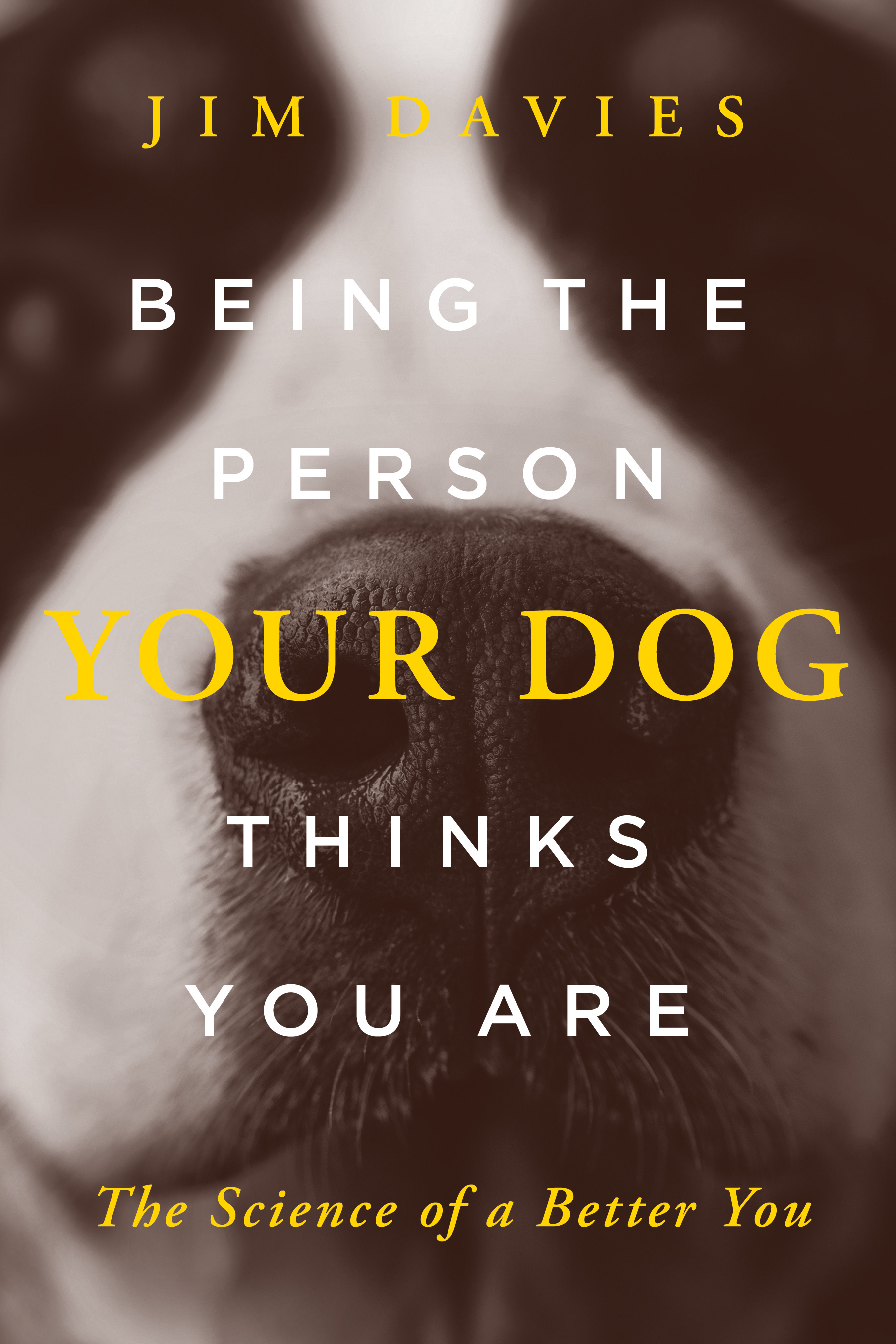
Title: Imagination: The Science of Your Mind's
Greatest Power
Author: Jim Davies
Hardcover: 326 pages
Publisher: Pegasus Books (November 5, 2019),
distributed by W. W. Norton & Company
Languages: English
ISBN-10: 1643132032
ISBN-13: 978-1-64313-203-7
APA Citation: Davies, J. (2019). Imagination: The Science of Our Mind's
Greatest Power. New York, NY: Pegasus Books.
Publicist: Jessica Case at Pegasus books, jessica@pegasusbooks.us
This book's webpage is at http://www.jimdavies.org/imagination/
The first-ever book on the science of imagination, which sheds light on both the complex inner-workings of our mind and the ways in which we can channel imagination for a better life.
We don't think of imagination the way that we should. The word is often only associated with children, artists and daydreamers, viewed as something separate from everyday adult life. However, imagination is an integral part of almost every action and decision that we make. Simply put, imagination is a person's ability to create scenarios in his or her head: this can include everything from planning a grocery list, to honing a golf swing, and even to having religious hallucinations. And while imagination has positive connotations, it can also lead to more pernicious outcomes including decreased productivity and cooperation, and much worse, the continuous reliving of past trauma. The human brain is remarkable in its ability to imagine—to create worlds and situations outside of its reality. We can imagine complex possible futures, fantasy worlds, and jars of peanut butter. We can use our imaginations to make us relaxed or anxious, and the most impressive feat of human imagination may be our ability to use it in creative endeavors. Sitting in a chair, with our eyes closed, we can imagine what the world might be, and construct elaborate plans. With such power, we have an obligation to use it for good--to make things better for ourselves, and for the world.
People have been fascinated with the machination of the human brain and its ability to imagine for centuries, but until now, there have been no popular science books that are dedicated to imagination. There are books on creativity, dreams, memory, and the mind in general, but how exactly do we create those scenes in our head? With chapters ranging from hallucination and imaginary friends to how imagination can make you happier and more productive, Jim Davies' Imagination will help us explore the full potential of our own mind.
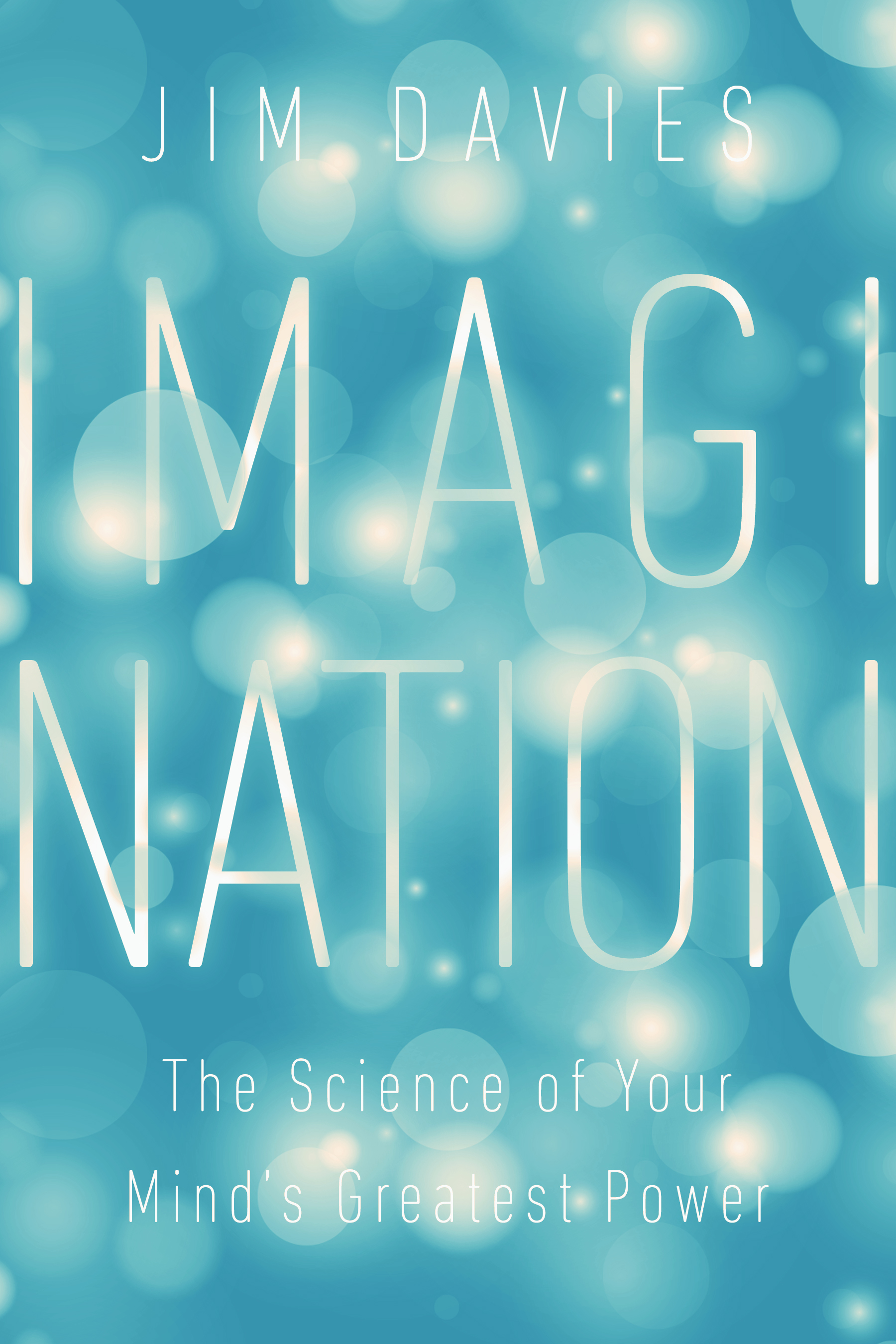
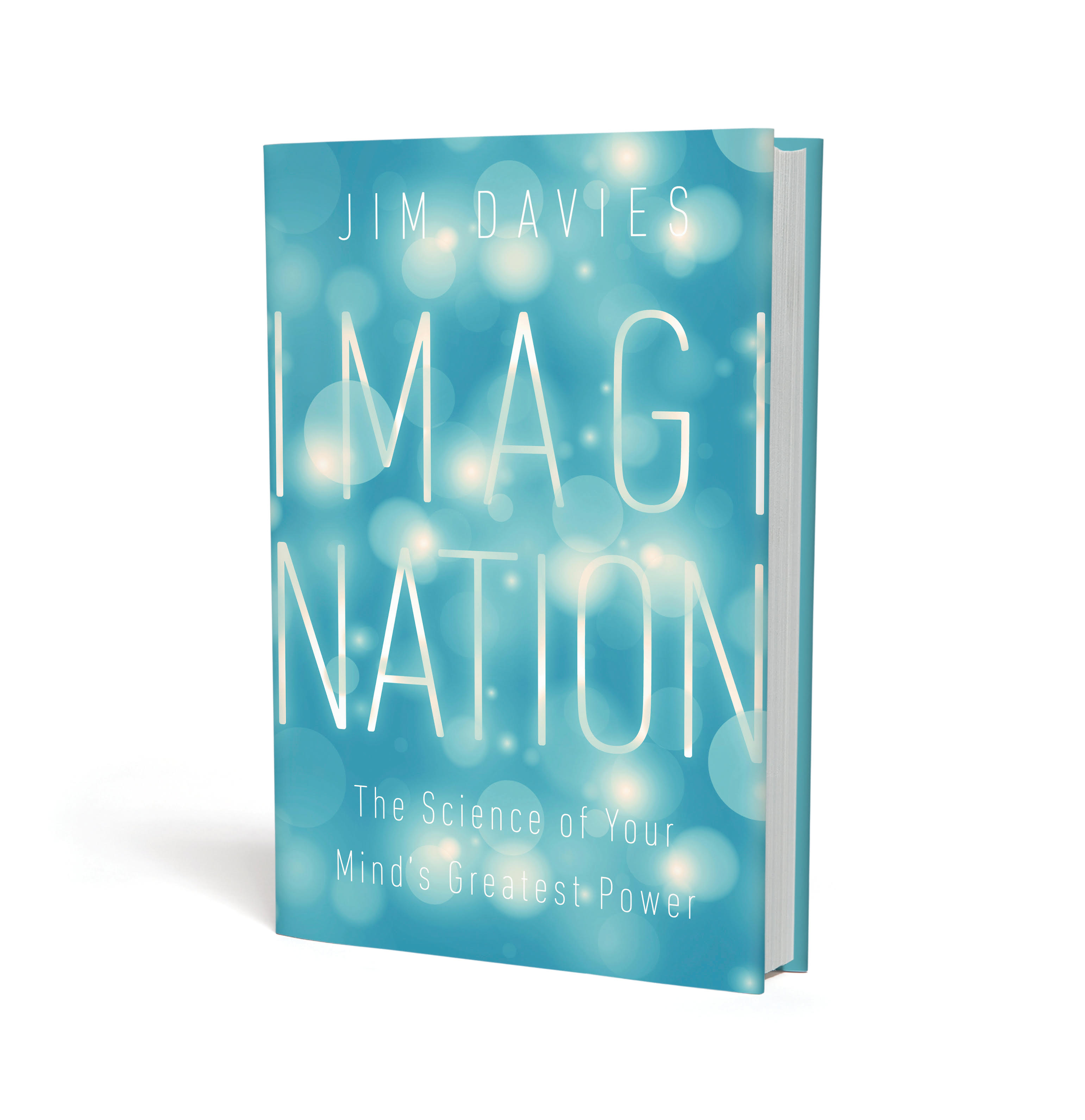
Title: Riveted: The Science of Why Jokes Make Us Laugh, Movies Make Us Cry, and Religion Makes Us Feel One with the Universe
Author: Jim Davies
Hardcover: 288 pages
Publisher: Palgrave Macmillan/St Martin's Press (August 5, 2014)
Languages: English, complex Chinese, Russian
ISBN-10: 113727901X
ISBN-13: 978-1137279019
APA Citation: Davies, J. (2014). Riveted: The science of why jokes make us laugh, movies make us cry, and religion makes us feel one with the universe. New York: St. Martin's Press.
Publicist: Lauren Janiec at Palgrave Macmillan, Lauren.Janiec@stmartins.com
This book's webpage is at http://www.jimdavies.org/riveted/
Why do some things pass under the radar of our attention, but other things capture our interest? Why do some religions catch on and others fade away? What makes a story, a movie, or a book riveting? Why do some people keep watching the news even though it makes them anxious?
The past twenty years have seen a remarkable flourishing of scientific research into exactly these kinds of questions. Professor Jim Davies' fascinating and highly accessible book, Riveted, reveals the evolutionary underpinnings of why we find things compelling, from art to religion, from sports to superstition. Compelling things fit our minds like keys in the ignition, turning us on and keeping us running, and yet we are often unaware of what makes these "keys," fit. What we like and don't like is almost always determined by subconscious forces, and when we try to consciously predict our own preferences we're often wrong. In one study of speed dating, people were asked what kinds of partners they found attractive. When the results came back, the participants' answers before the exercise had no correlation with who they actually found attractive in person! We are beginning to understand just how much the brain makes our decisions for us: we are rewarded with a rush of pleasure when we detect patterns, as the brain thinks we've discovered something significant; the mind urges us to linger on the news channel or rubberneck an accident in case it might pick up important survival information; it even pushes us to pick up People magazine in order to find out about changes in the social structure.
Drawing on work from philosophy, anthropology, religious studies, psychology, economics, computer science, and biology, Davies offers a comprehensive explanation to show that in spite of the differences between the many things that we find compelling, they have similar effects on our minds and brains.
Riveted reveals the evolutionary underpinnings of why we find things compelling, from art to religion and from sports to superstition. Drawing on work from philosophy, anthropology, religious studies, psychology, economics, computer science, and biology, Davies offers a comprehensive explanation to show that in spite of the differences between the many things that we find compelling, they have similar effects on our minds and brains.
Book images:
To download, right click on a PC and command-click on a Mac.



Please credit the photograph to Franklin McKay.